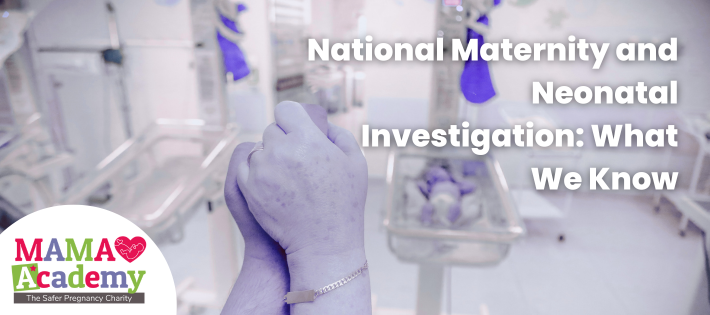National Maternity and Neonatal Investigation: What We Know
Published on: 16/09/2025
In the summer of 2025, the Department of Health and Social Care began a new independent investigation into maternity and neonatal care across England. This investigation is looking at how services are delivered, how safe they are, and what might need to change.
What the Investigation Aims to Do
The investigation has been set up to:
Develop national recommendations to improve the quality and safety of maternity and neonatal care in England.
Look at inequalities in care and consider how to make services fairer.
Hear directly from families and parents, including those who have been bereaved.
Examine 14 NHS trusts in detail and use the findings to inform national recommendations.
The investigation has said it will include the views of mothers, fathers, non-birthing partners, and other family members affected by maternity and neonatal care.
Lived Experience
Your experiences are part of the evidence the investigation is gathering. This includes:
Accounts from families involved in previous inquiries.
Stories from those who have been harmed or faced poor care.
The impact of adverse experiences on mental health, physical health, and family life.
Quality and Safety
The investigation will review maternity and neonatal services across England, looking at:
How different NHS trusts deliver care and how this compares to national guidance.
How risks are recognised and managed.
How services respond when things go wrong, including how families are informed.
How accountability and learning are handled.
Inequalities
The investigation will explore the reasons why outcomes and experiences can differ between groups, particularly for:
Women, babies, and families from Black and Asian backgrounds.
Families from deprived or marginalised communities.
It will look at possible drivers such as racism, discrimination, language barriers, and lack of culturally sensitive care.
Staff Experience
The investigation will also look at how NHS staff are supported, including training, recruitment, and workplace culture, and how these affect the care families receive.
Responses When Things Go Wrong
When harm or preventable deaths occur, the investigation will review:
How NHS trusts and integrated care boards (ICBs) respond.
How complaints and whistleblowing are handled.
How bereavement care is provided.
How families are kept informed and whether they can access records.
The investigation may also look at whether coroners could play a role in investigating stillbirths at 37 weeks or later.
Previous Recommendations
Since 2015, several inquiries and investigations have made recommendations to improve maternity care. This new investigation will check how many of these have been implemented, what difference they have made, and why some have not been put into practice.
Good Practice and Investment
The investigation will gather examples of good practice from England and other countries, as well as consider how funding, facilities, and staffing affect care quality and safety.
Trusts Being Reviewed
The investigation includes detailed reviews at 14 NHS trusts across England, including Blackpool, Bradford, Leicester, Leeds, Sandwell & West Birmingham, Gloucestershire, Somerset, Oxford, Sussex, Barking, Havering & Redbridge, and King’s Lynn. Three further trusts, Morecambe Bay, East Kent, and Shrewsbury & Telford, are also included as they have been reviewed before.
Timelines
Initial findings are expected in December 2025, with further reports due in spring 2026.
Sharing Your Experience
There will be a public call for evidence as part of this process. If you wish to share your experience of maternity or neonatal care, this may be an opportunity to contribute.
Finding Support
Reading about maternity investigations and care failings can bring up difficult emotions, especially if you have experienced harm or loss yourself. If you need support, you are not alone.
MAMA Academy Non-Emergency Helpline – Speak to compassionate midwives who can offer support and signposting here.
MAMA Academy Maternity Directory – Find mental health professionals and support services in your area here.
Samaritans – Call 116 123 free, day or night, if you are struggling to cope.
In an emergency – If you or someone you know is in immediate danger, please call 999.
